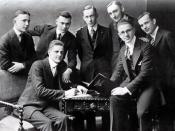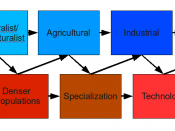From the first existence of societies there have been inequalities. These inequalities have been linked mostly to the amount of surplus the particular society produces, and who has control over it. The hunting and gathering society had very little inequality because they were unable to produce surplus. Whatever was provided was usually consumed within days. A headman was in charge of distributing the food so that everyone was provided for. The shift from hunting and gathering to horticulture provided societies with the means of establishing an economic surplus, if it was not completely consumed by the members. An ideology began that motivated the producers of food to turn over part of their harvest to an individual in authority who could dispense it as he saw fit. Because a government handled the surplus, inequality increased. There was a big difference between hereditary nobility and the mass commoners. Religion and politics were practically combined.
With the invention of the plow, came agrarian societies. It was faster and more efficient than human labor, which caused its use to spread. This increased the amount of agrarian societies. Along with the plow, forms of writing and counting developed. Cities began to develop, and empire building started. The population and levels of surplus increased greatly, and the levels of inequality skyrocketed. As agrarian societies began to shift to industrial, the levels of inequality began to decrease. Newly developing ideologies and rapidly advancing technology helped the levels of inequality to decrease in these industrial societies.
One of the new ideologies is democratic republicanism. This ideology refuted the hereditary monarchy of the agrarian societies. In agrarian societies, there were no laws that called for equality. Inequality was built into the legal codes. People were born into classes; they did not gain their status from working. Each class...


